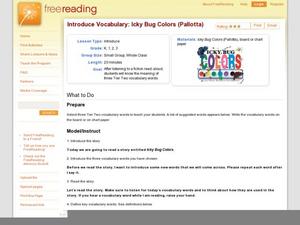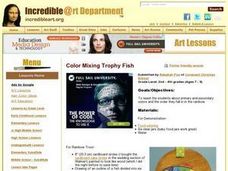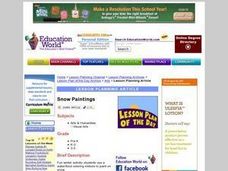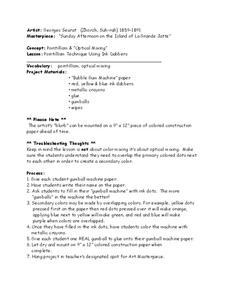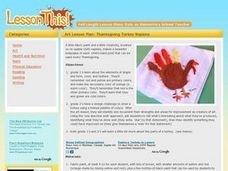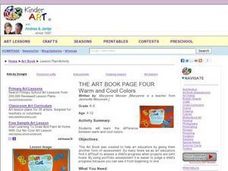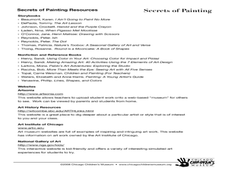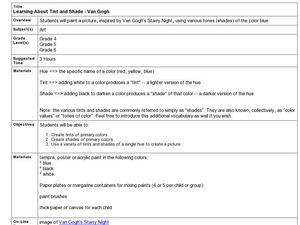Curated OER
The Art and Science of Impressionist Color
Discover Impressionist painting as students investigate the 19th century combinations of colors characteristically used. Students experiment with their own paintings, utilizing primary and secondary colors.
Curated OER
Shaping the Color Wheel
When you paint you almost always use color. Budding artists explore the color wheel, color vocabulary, and painting techniques. They discuss and practice mixing colors, then paint a color wheel for personal reference.
Curated OER
Introduce Vocabulary: Icky Bug Colors (Pallotta)
Get to know the bugs around us with emerging readers who use Jerry Pallotta's informative book Icky Bug Colors to learn vocabulary in context. Address terms before reading the text aloud, preparing kids to listen for them later. Here,...
Kids Can Have Fun
Cut and Paste Sea Creatures
Beautiful sea creatures help teach young children about colors in a simple cut-and-paste activity. After looking at fun illustrations of fish, dolphins, crabs, and octopi, youngsters must cut out and match a series of colored circles to...
Curated OER
Boogie Woogie Colors - Mondrian Painting
Students create art in the style of Piet Mondrian. They review works by Mondrian, identify primary and secondary colors and then use construction paper, cut strips of paper and paint to create a piece of art that incorporates geometric...
Curated OER
Color Mixing Trophy Fish
Students compare colors. In this color lesson, students determine which colors are primary and which are secondary. Students investigate rainbows and create a piece of art organizing colors as they appear in a rainbow.
Curated OER
Color Mixing/ Fantastic Shapes in Paining
Young scholars paint shapes in pictures using all of the colors in the color wheel. For this colors lesson plan, students learn about primary and secondary colors, and create non representational art with the colors.
Curated OER
Snow Paintings
Students work with water and food coloring as their medium to paint snow. They mix primary colors to make new colors while they decide on appropriate for their snow paintings as they relate to the curriculum.
Curated OER
Color Scheme Acrylic Painting Self-Assessment
Being a good artist means being able to critique your own work. Here young painters will take a short quiz on color schemes in acrylic painting and then reflect on their use of color in a recently completed piece. A great worksheet for...
Curated OER
Pointillism Technique Using Ink Dabbers
A gumball machine art project is a great way to learn about optical mixing in a study of pointillism and Georges Seurat. Kids create their own masterpieces and learn about primary and secondary colors in the process.
Curated OER
Terrific Tessellations
Students create to pieces of artwork using two primary colors and tessellation techniques. This is an excellent lesson that can be accomplished using standard art techniques or educational software such as Adobe Photoshop or Microsoft...
Curated OER
Mixing It Up: The Color Wheel
Colors are the focus of this color wheel worksheet. Students experiment with colors by viewing a color wheel, then filling in the primary colors which are missing on another wheel. Students also decide which colors are made when two...
Curated OER
Mixing Colors with "Little Blue and Little Yellow"
Students mix colors to make new colors. In this color mixing lesson, students listen to Leo Lionni's Petit Bleu et Petit Jaune, before retelling the beginning, middle, and end of the story. They watch as the teacher mixes food coloring...
Curated OER
Keith Haring And Aboriginal Art
Students explore the art of Keith Haring and examine how it relates to Aboriginal art. In this fundamentals of art lesson, students examine the fundamental elements of art, such as, line, symmetry, contrast, balance, color tints, and...
Curated OER
Mixing Primary and Secondary Colors
Students use Play Doh to make a color wheel. In this color wheel lesson plan, students use primary and secondary colors of Play Doh to make a color wheel.
Curated OER
Thanksgiving Turkey Napkins
Young scholars explore painting. In this Thanksgiving art lesson plan, students trace their hands on 4 cloth napkins sent from home and use fabric paint to decorate them as hand print turkeys.
Curated OER
Warm/cool Colors - Page 4
Students draw pictures that make them feel either warm or cool using only the warm and cool colors.
Curated OER
Secrets of Painting
Students explore colors and shapes. In this art concepts lesson, students discuss shapes, lines, and color while creating a variety of abstract designs. The instructions for several art activities are provided. Basic art vocabulary and a...
Curated OER
Learning Secondary Colors
Students identify secondary colors. For this visual arts lesson, students predict what color will be made when two colors are mixed. Students create their own painting using secondary colors and write about their painting in their journals.
Curated OER
Chromatography Lab
Students discover the components of primary and secondary colors. For this physical science lesson, students create a set up in which water will separate a color into the component colors along a piece of filter paper. Students will then...
Curated OER
Learning about Tint and Shade- Van Gogh
Students explore tint, hues, and shades of color. In this art and color lesson, students observe and discuss Van Gogh's artistic style. Students mix paints to create a single hue background and add details to paint a nightscape of...
Curated OER
What is It? Susie Sees!
Students explore the five senses. In this cross curriculum five senses lesson, students view an "I Can See Colors" PowerPoint presentation and sort items by color and shape. Students mix primary color paints to create secondary colors,...
Curated OER
Exploring Optical Movement in Art
Young scholars describe, represent and analyze patterns and relationships using shapes. They create simple geometric patterns. They demonstrate increasing technical ability and skill to complete visual arts assignments.
Curated OER
Clay Tile: Art Deco Style
Students analyze and classify sets of pictures using a mathematical classification system and create original works of Art Deco tiles using this new knowledge and four types of symmetry.




